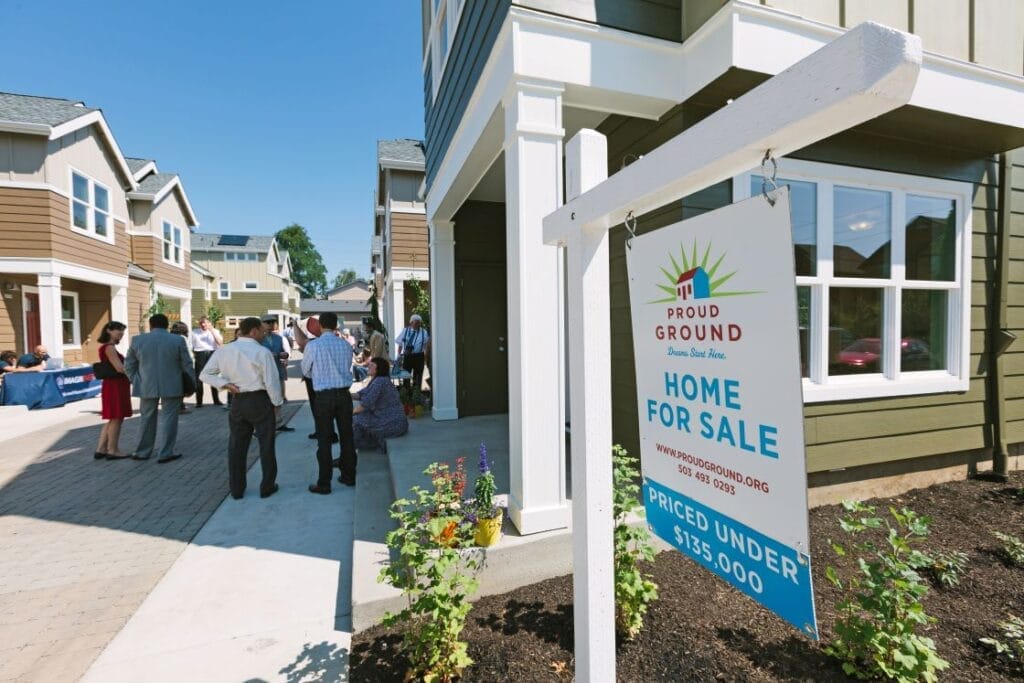Housing Affordability That Lasts


Community land trusts like Proud Ground in Portland, Oregon, provide homeownership opportunities that remain affordable from one qualified buyer to the next. Credit: Proud Ground.
By Anthony Flint, December 16, 2024
The high cost of housing was top of mind for voters in last month’s election. Frustrations boiled over as ever-higher rents soaked up monthly paychecks, and affordable first-time starter homes remained scarce.
A record 43 million US households are cost burdened—meaning they spend more than 30 percent of their income on housing costs—that’s according to an analysis released this month by Harvard University’s Joint Center for Housing Studies. Home prices reached a new all-time high in 2024, such that the US home price index is now nearly 50 percent higher than in early 2020.
The near-term solution, according to most economists and policymakers, is to increase supply—particularly of multifamily housing—by better identifying buildable land and easing overly restrictive zoning.
But there’s a companion approach that has been quietly producing good results from coast to coast: community land trusts (CLTs), which offer buyers the chance to purchase a home without having to pay for the land underneath—the land being the most expensive part.
As a critical bonus, that affordability is permanent, because CLTs impose strict limits on resale price, which keeps the homes accessible for one income-qualified household after another.
There are just over 300 CLTs in the US, up from 200 in 2008, but it’s a model deserving of ways to scale up. John Emmeus Davis and Kristin King-Ries, coauthors of the recently published Lincoln Institute report, Preserving Affordable Homeownership: Municipal Partnerships with Community Land Trusts, joined the conversation at the Land Matters podcast to explain how these extraordinary communities have thrived.
John Davis is a city planner who has spent much of his 40-year career providing technical assistance to CLTs and documenting their history and performance. He coauthored the Lincoln Institute’s 2008 Policy Focus Report The City-CLT Partnership. He has served as housing director in Burlington, Vermont, and is a partner at Burlington Associates in Community Development LLC, a national consulting cooperative. He is a founding board member of the International Center for CLTs and editor in chief of the center’s imprint, Terra Nostra Press.
Kristin King-Ries is an attorney whose practice focuses on creating and stewarding permanently affordable homes and farms for people priced out of the traditional real estate market. She represents CLTs and other nonprofits and serves as a consultant to the Agrarian Trust and the Center for Agriculture and Food Systems at the Vermont Law and Graduate School. She is currently organizing a CLT legal collaborative on behalf of the International Center for CLTs.
Listen to the show here or subscribe to Land Matters on Apple Podcasts, Spotify, Stitcher, YouTube, or wherever you listen to podcasts.
The report is available for free downloading here.
Anthony Flint is a senior fellow at the Lincoln Institute of Land Policy, host of the Land Matters podcast, and a contributing editor of Land Lines.
Further Reading
New Report Explores How City-CLT Partnerships Preserve Affordable Homeownership, Land Lines
An Affordable Housing Solution Hiding in Plain Sight, Banker & Tradesman
The Community Land Trust Reader, Lincoln Institute
New Laws Open Doors to Affordable Shared Housing Arrangements, Pew Charitable Trusts
